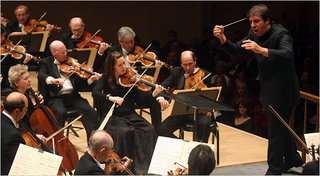|
Back
From Boston to New York New York
Carnegie Hall
10/01/2009 -
Ludwig van Beethoven: Coriolan Overture
Frederic Chopin: Piano Concerto No. 2 in F Minor
John Williams: Concerto for Harp
Claude Debussy: La Mer
Evgeny Kissin (piano), Ann Hobson Pilot (harp)
Boston Symphony Orchestra, Daniele Gatti (conductor) 
D. Gatti (© Boston Symphony Orchestra)
Venerable Carnegie Hall opened its 119th season last night, with a guest performance by the Boston Symphony. Momentous opening nights are a New York legend, so what a disappointment it was to be treated to such a dull concert. Of course it did not help that Boston Symphony music director James Levine cancelled at two day’s notice due to emergency surgery for a herniated disc, a condition that also led him to withdraw from the already infamous new production of Puccini’s Tosca at the Metropolitan Opera. He left the baton to the able but inadequately prepared Italian conductor Daniele Gatti. Already in town to conduct Verdi’s Aida at the Met, Gatti led the orchestra competently but without taking any great risks or demonstrating much excitement.
Indeed, with the selection of music one wonders how anyone could be excited. Berlioz’s Le Carnaval romain, drawn from the composer’s opera Benvenuto Cellini, offered the most promise. Maestro Levine has championed Berlioz’s music over the past couple of decades and emerged as one of its greatest interpreters. Gatti was not up to the challenge of conducting the piece, however, and substituted Beethoven’s grim Coriolan Overture. Boston’s players meditated well over the sacrifice of the noble Roman protagonist, but it was hardly an ebullient start to the new season. The next work, Chopin’s Piano Concerto No. 2, sounded more colorful with the contribution of the brilliant Russian pianist Evgeny Kissin. Kissin, who also played the piece this season for the opening nights of the Boston Symphony (at home) and of the National Symphony in Washington, played artfully, though compared to his performance in Washington last weekend, he seemed out of step with the orchestra under Gatti’s conducting. The concerto itself, really Chopin’s first work in the genre (his Piano Concerto No. 1 was written later than this piece but published earlier and is thus listed first), is not among the concert repertoire’s most thrilling selections. But Kissin’s rubato added Romantic qualities that are often minimized to suit the tastes of more classically-minded listeners. The audience enthusiastically applauded Kissin, who resisted his frequently indulged temptation to present a large number of encores and instead gave only two: Liszt’s Valse Caprice No. 6 and Chopin’s fast-paced Minute Waltz. He delivered both gracefully, though neither piece was identified to the audience.
The second part of the program opened with the New York premiere of former Boston Pops conductor John Williams’s newest work, the Concerto for Harp written to honor the retirement of the Boston Symphony’s principal harpist, Ann Hobson Pilot. Pilot, who leaves the orchestra after 40 years, played the solo part herself with great delicacy. The program notes relate that she had asked Williams to compose such a piece for her for many years, but that the composer demurred. After hearing it, one can understand why he would have done so. The technical difficulty of integrating a solo harp into a full orchestral piece threatens major limitations, most of which were on display. It seemed that the only feasible solution was to write a weak score overall. Williams accomplished this by basing the concerto’s two parts on a self-described “fascination with trees,” in this case the mild willow and birch. The adagio “On Willows” movement proved virtually indistinguishable from Williams’s more insipid film scores, quietly suggesting something bad was about to happen. The allegro con gioia “On Birches” was naturally more energetic, but left one feeling that the stated duration of 15 minutes had stretched into 20 or 25. The evening ended with Debussy’s La Mer, the 1907 US premiere of which was coincidentally given by the Boston Symphony in a guest performance at Carnegie Hall. Gatti’s interpretation was more energetic and alluring than in any other piece last night, leaving one with the wish that the entire concert had matched its vivacity.
Paul du Quenoy
|